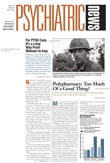Racial bias and stereotyping may play a role in the disparities that exist in the way racial and ethnic minorities are treated by physicians, said past AMA president Alan Nelson, M.D., in a Webcast panel discussion on disparities in health care sponsored by the Kaiser Family Foundation.
Nelson, who was the chair of the Institute of Medicine’s Committee on Understanding and Eliminating Racial and Ethnic Disparities in Health Care, was joined by other public health experts in emphasizing the existence of disparities not only in access to medical care and the amount of health care received by minorities, but also in the actual quality of care when minority patients do get treated.
“The committee looked specifically to see if there was clear evidence of racism as a factor and was unable to find direct evidence of that,” Nelson said. “It’s possible to find direct evidence in housing or jobs where you can send testers into the market, but you can’t send testers into a hospital to try to measure that.”
He said, however, that evidence from simulated patient-physician interactions and behavioral science literature suggest that biases and stereotyping can work their way into the interaction between a physician and a patient.
“There was enough evidence that led us to conclude that bias may play a role, even though we didn’t find systemic racism,” he said. “It occurs because we live in a nation where racism has been a problem and a fact of life for 300 years, and health care workers are members of the nation like everyone else.
“It’s a shortcut in which you attribute the characteristics to an individual of a certain population that may or may not be relevant,” he continued. “It’s a mental shortcut we all make in many judgments daily.”
Nelson said that for this reason, expanding culturally competent care had been identified as a priority by the AMA, the American Association of Medical Colleges, the Joint Commission on Accreditation of Healthcare Organizations, among other agencies within organized medicine. APA has done a lot of work in this area, specifically in regard to access to mental health care.
“The less time there is to understand a patient’s need, the more likely the [stereotyping] behavior [will occur],” he said. “And that’s why we encourage health plans, especially Medicaid health plans, to allow physicians enough time to counteract that.”
Nelson was joined by Georges Benjamin, M.D., executive director of the American Public Health Association (APHA), and Marsha Lillie-Blanton, Dr.P.H., vice president and director of race/ethnicity and health care at Kaiser Family Foundation. The Webcast was held last month at the beginning of National Public Health Week, whose theme was eliminating disparities in health care.
Benjamin said a key to addressing the problem of disparities are tools, including the presence of interpreters in hospitals and other health care settings, for overcoming language barriers.
“Certainly, when you go into a hospital, you should have a reasonable expectation that you’ll be able to communicate with the provider who is taking care of you,” Benjamin said. “And the Joint Commission on Accreditation of Healthcare Organizations does require that hospitals have a capacity to adequately communicate with patients. Whether they do that by having interpreters or by having materials in multiple languages, it’s up to the community to solve the problem.”
Benjamin said the APHA was compiling a database of local programs from around the country designed to address disparities in health care. The database can be accessed online at www.apha.org.
But Nelson said requirements for presence of interpreters—particularly at the level of the office-based physician—must be accompanied by reimbursement for those services. “One of the problems is that it has amounted to an unfunded mandate, and many clinicians may have difficulty providing interpreter services if it costs three times as much for the interpreter as the payment for the care the physician is providing.”
Nelson added that he believes that increasing the number of minority physicians is also important. “There may not be hard data to show reduced disparities [in quality of care] received by patients who receive care from minority clinicians, but patient satisfaction is higher,” he said. “Intuitively, I think it would be easier to create that communication bond between people of the same race.”
Asked to outline the most important next steps in eliminating disparities, Lillie-Blanton drew attention to the need for expanding sources of insurance for the uninsured. And for the insured population, access to a regular source of medical care is crucial.
“Every individual needs to have a consistent relationship with a health provider,” she said. “We know that 1 of 5 African Americans and Latinos does not have a regular source of medical care. And those who do are more likely to rely on an emergency department or hospital-based source of care.”
A transcript of the Webcast is posted online at www.kaisernetwork.org/health_cast/hcast_index.cfm?display=detail&hc=1103. ▪
